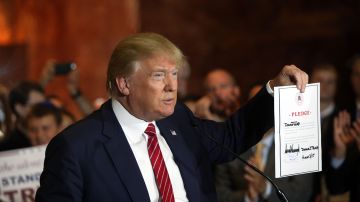Editorial: Nativists and Spanish
Donald Trump continues to exploit the fear of immigrants by turning to stereotypes

El magnate Donald Trump muestra el documento en el que se compromete a apoyar al candidato republicano que obtenga la nominación de su partido para buscan la presidencia de EEUU. Crédito: Getty
Nothing enriches people and countries like the richness of languages and cultures they represent. Yet Spanish is still being used as a political and demagogic weapon in the US, where it sometimes seems that only English is understood and only what is said in English is heard and seen.
Learning and becoming fluent in English is essential to obtain success in the U.S. It is a matter of common sense recognized by both immigrants and natives. Equally, speaking a second language is a powerful tool to stay competitive in the global economy. However, what could be a virtue becomes a flaw, as presented in the Republican presidential primary.
It is fair to acknowledge the fact that the Republican National Committee, as many of its members do, recognizes a politician’s capacity to communicate in the language of the electorate and have his or her message reach them effectively, especially if it is the size of the Latino constituency.
While candidate Jeb Bush’s bilingual capabilities should score points in his favor – as when he responded in Spanish to a question posed to him in that language, – he got a remark from Donald Trump saying that Bush “should really set the example by speaking English while in the United States.”
Trump’s criticism is part of his strategy to relentlessly attack every step taken by Bush, who is considered to be the preferred presidential candidate among the GOP establishment. It also belongs to the anti-immigrant message he is catering to a nativist, white base that sees foreigners as the root of all evil. To these voters, the mere mention of Spanish in this context refers them to an idea of immigrants as people who refuse to learn English and who wish to impose their culture on the U.S., a picture that awakens nativist fear and resentment.
However, the reality is very different. Schools teaching English to adults are at full capacity serving the scores of immigrants wanting to learn the language. As the percentage of Latinos who speak English increases, data from the Pew Research Center and the Bureau of the Census state that 8 of every 10 Latino youths speak both languages.
The problem is that Trump is holding the reins at the Republican debates and, aside from Bush, no other contender dares to contradict such outbursts for fear of offending that sector of the Republican base.
By way of anti-immigrant stereotypes and backwards values such as linguistic nationalism in the midst of the globalization era, Trump’s stridency and his front-runner spot at the primaries are obliterating the Republican goal of attracting Latinos. But this raises questions about the future of the United States as a global society where multicultural diversity and the ability to understand, think and speak like others is a major competitive advantage in globalization. Nationalism, whether linguistic or based on exclusivity, have a place in the new world.




